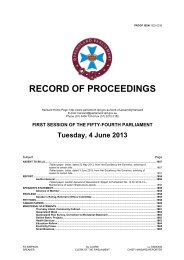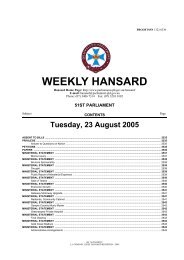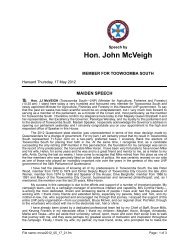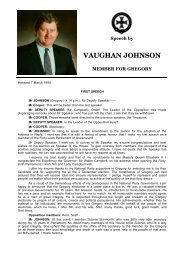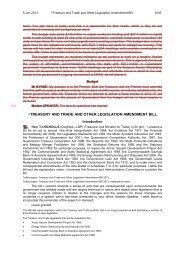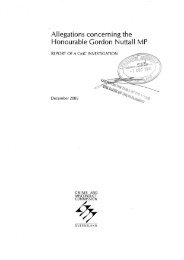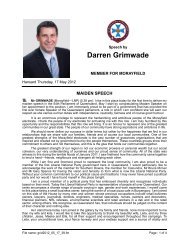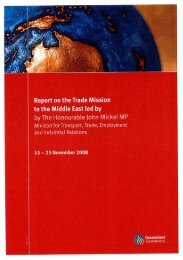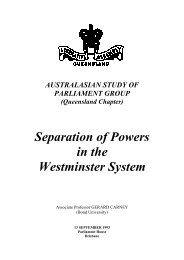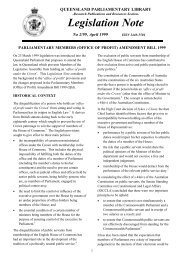Full transcript - Final - Queensland Parliament - Queensland ...
Full transcript - Final - Queensland Parliament - Queensland ...
Full transcript - Final - Queensland Parliament - Queensland ...
You also want an ePaper? Increase the reach of your titles
YUMPU automatically turns print PDFs into web optimized ePapers that Google loves.
376 Land and Resources Tribunal Bill 9 Mar 1999<br />
The tribunal will have jurisdiction also in relation<br />
to hearings under the alternative State<br />
provisions established under the Native Title<br />
(<strong>Queensland</strong>) State Provisions Amendment<br />
Act (No. 2) of last year and any ongoing issues<br />
relating to agreements created under them.<br />
The Wardens Court has served the<br />
community well for over 100 years in solving<br />
disputes and setting conditions on mining<br />
activities within our State. But the present<br />
complexity of many mining applications<br />
requires a greater perspective and a broader<br />
understanding of issues, including native title<br />
issues, in determining if and how mineral<br />
development will take place in <strong>Queensland</strong>. It<br />
is extremely important for the economic growth<br />
of <strong>Queensland</strong> that we can develop the<br />
mineral resources of the State and, by doing<br />
so, create investment and, of course, jobs.<br />
This Government recognises that new<br />
mineral developments must take many<br />
interests into account in deciding if and how<br />
the resources can be extracted. It is no longer<br />
the case that if the minerals are in the ground<br />
then automatically they should be produced<br />
and, as such, this legislation takes this into<br />
account. Modern day issues are complex<br />
involving land-holder rights, native title rights,<br />
environmental issues, planning considerations<br />
and the economic needs of the State.<br />
The tribunal also will have jurisdiction<br />
under the Cultural Record (Landscapes<br />
<strong>Queensland</strong> and <strong>Queensland</strong> Estate) Act of<br />
1987 and the Government's forthcoming new<br />
indigenous cultural heritage legislation. The<br />
tribunal will comprise a president, two<br />
additional presiding members, three nonpresiding<br />
members, a registrar and deputy<br />
registrars. Complex cases and any cases<br />
involving native title are to be heard by a<br />
multiple member panel.<br />
The Commonwealth Native Title Act of<br />
1993 requires that a member of the National<br />
Native Title Tribunal participate when the<br />
tribunal is determining objections by native title<br />
parties to grants of tenures on unallocated<br />
State land. The president of the tribunal is a<br />
position equivalent to a Supreme Court judge<br />
and the deputy presidents' positions are<br />
equivalent to that of a District Court judge.<br />
Presiding members are appointed for life<br />
unless they retire or their positions are<br />
terminated. This will ensure that the tribunal will<br />
be a highly respected body, which is in<br />
keeping with the importance of the mining<br />
industry to our State.<br />
A mining referee will also be appointed for<br />
a five-year term. The mining referee will hear<br />
and determine many of the procedural matters<br />
arising from small mining leases and mining<br />
claims, prospecting permits, exploration<br />
permits and fossicking. Referees will be<br />
eminently qualified, but will not have voting<br />
rights on the tribunal. In addition to being<br />
eligible for appointment as a Supreme Court<br />
judge, a mining referee must have mining<br />
industry knowledge and experience, as well as<br />
experience in land title and land uses or other<br />
relevant expertise. This will ensure that the<br />
mining referee is familiar with industry practice.<br />
More than one mining referee may be<br />
appointed under this legislation.<br />
The Wardens Court was characterised by<br />
its presence on the mining fields and by an<br />
ability to decide a matter quickly and fairly.<br />
Those characteristics are retained in the<br />
structure of this tribunal with the position of the<br />
mining referee. These hearings will be in towns<br />
near the mining fields so that the miners and<br />
landowners involved do not incur unnecessary<br />
costs. The Bill provides that compensation<br />
hearings, which are currently heard by the<br />
Wardens Court, will be heard by the tribunal<br />
composed either as the mining referee or a<br />
single land court non-presiding member.<br />
The Government prefers the parties to<br />
reach agreement on the terms and conditions<br />
for development, and I expect this will still<br />
happen in the majority of cases. We will be<br />
providing mediation assistance to resolve<br />
disputes at all stages of the application for<br />
mining tenures. In addition to the mediation<br />
offered by mining registrars in the early stages<br />
of mining tenure applications, the tribunal will<br />
have a mediation referee and trained<br />
mediators to assist parties in resolving their<br />
issues at various stages in the process. But in<br />
those cases where agreement cannot be<br />
reached, there is a need for a well-resourced<br />
and highly respected arbitral body—which the<br />
Land and Resources Tribunal certainly will be.<br />
Such an increased status of the tribunal has<br />
long been asked for by most parties involved<br />
in this industry—mining companies,<br />
landowners, environmental groups and local<br />
governments. The issues in competing land<br />
uses are becoming more and more complex,<br />
and the ability of one person to determine this<br />
wider range of issues has been increasingly<br />
questioned.<br />
Where the Wardens Court had jurisdiction<br />
for a proceeding under the Mineral Resources<br />
Act 1989 immediately before the<br />
commencement of section 83, the tribunal has<br />
the jurisdiction to finish the proceeding. The<br />
tribunal will be sufficiently resourced to enable<br />
it to travel to regional centres to hear cases<br />
and make determinations. This will be<br />
important for its credibility and profile. By



